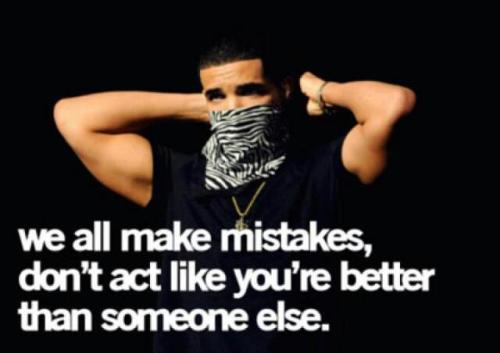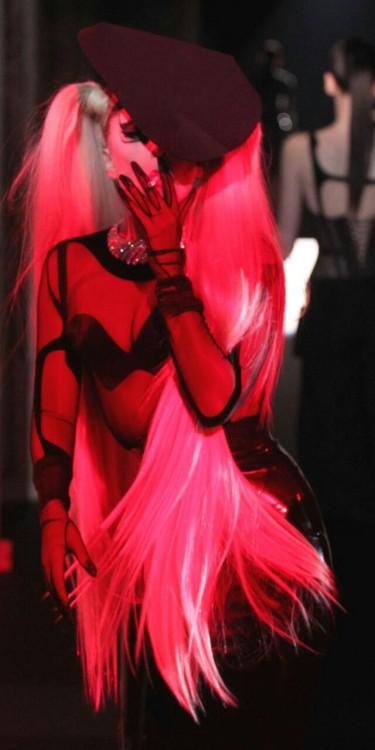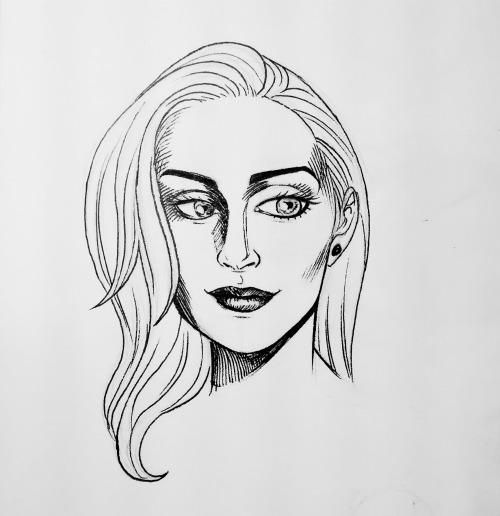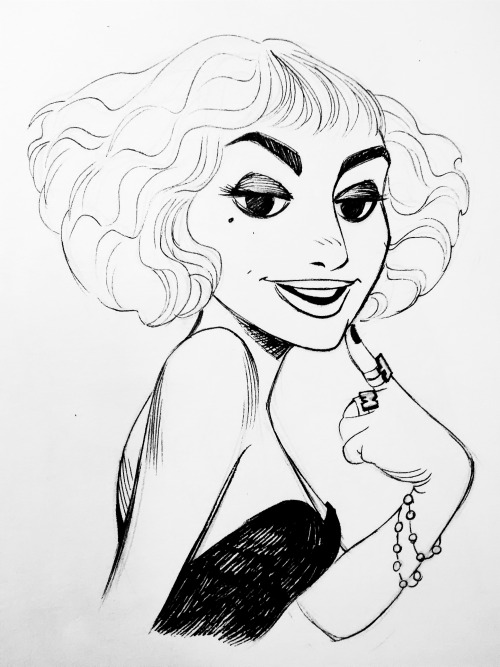#born this way


I’m on the right track, baby
I was born this way
Happy 10th birthday Born This Way!! Paws Up!!
Likeness study of Lady Gaga made in ZBrush and Blender. Based on her look in the video for ‘Marry the Night’. Happy 10th anniversary of Born This Way!
Post link
Ride This Out by Imaginary Cities is my new jam.
The Tyranny of Tyranny by Cathy Devine
A critical response to The Tyranny of Structurelessness.
There are (at least) two different models for building a movement, only one of which does Joreen acknowledge: a mass organisation with strong, centralised control, such as a Party. The other model, which consolidates mass support only as a coup de grace necessity, is based on small groups in voluntary association.
Joreen associates the ascendency of the small groups with the consciousness-raising phase of the women’s movement, but concludes that, with the focus shifting beyond the changing of individual consciousness towards building a mass revolutionary movement, women should begin working towards building a large organisation. It is certainly true and has been for some time that many women who have been in consciousness-raising groups for a while feel the need to expand their political activities beyond the scope of the group and are at a loss as to how to proceed. But it is equally true that other branches of the Left are at a similar loss, as to how to defeat capitalist, imperialist, quasi-fascist Amerika.
What we definitely don’t need is more structures and rules, providing us with easy answers, pre-fab alternatives and no room in which to create our own way of life. What is threatening the female Left and the other branches even more, is the ‘tyranny of tyranny’, which has prevented us from relating to individuals, or from creating organisations in ways that do not obliterate individuality with prescribed roles, or from liberating us from capitalist structure.
I read “The Tyranny of Structurelessness” yesterday, so I thought it would be fitting to read a critique of it today. I like Cathy’s emphasis on cultural change and building friendships to prevent burnout and relieve “feelings of personal shittiness”, but I think those things can also exist in a structured organization. I think she missed the point Jo made about structure – not as a monolithic organization commanded by a few, but an acknowledgment of power that inevitably arises in groups.
I was completely turned off by her metaphor of sex and organization: “Men tend to organise the way they fuck - one big rush and then that ‘wham, slam, thank you maam’, as it were. Women should be building our movement the way we make love - gradually, with sustained involvement, limitless endurance - and of course, multiple orgasms.” First, that’s exceedingly stereotypical and moderately offensive. I’ve also been thinking about the gender spectrum and what it means when feminism presents a dichotomy of “man” and “woman”. Later on, Cathy says that feminist revolution “means destroying the masculine and feminine roles which make both men and women only half human”. I find it difficult to reconcile the condemnation of binary gender roles while being dependent on some sort of definition of “woman”. When we remove social constructs like gender, what does feminism mean? The more I read, the less I feel like I know; going to add a bunch of social constructionism and feminist theory articles to my reading list now.
I am not a story by Galen Strawson
Some find it comforting to think of life as a story. Others find that absurd. So are you a Narrative or a non-Narrative?
So say the narrativists. We story ourselves and we are our stories. There’s a remarkably robust consensus about this claim, not only in the humanities but also in psychotherapy. It’s standardly linked with the idea that self-narration is a good thing, necessary for a full human life.
I think it’s false – false that everyone stories themselves, and false that it’s always a good thing. These are not universal human truths – even when we confine our attention to human beings who count as psychologically normal, as I will here. They’re not universal human truths even if they’re true of some people, or even many, or most. The narrativists are, at best, generalising from their own case, in an all-too-human way. At best: I doubt that what they say is an accurate description even of themselves.
But Nietzsche is more specific: ‘perhaps by what they are and by their sequence, they will yield… the fundamental law of your true self.’ Here it seems I must either disagree with Nietzsche or concede something to the narrativists: the possible importance of grasping the sequence in progressing towards self-understanding.
I concede it. Consideration of the sequence – the ‘narrative’, if you like – might be important for some people in some cases. For most of us, however, I think self-knowledge comes best in bits and pieces. Nor does this concession yield anything to the sweeping view with which I began, the view – in Sacks’s words – that all human life is life-writing, that ‘each of us constructs and lives a “narrative”, and that ‘this narrative is us’.
This is related to the story I read a few days ago, Seeing Myself: In Search of the Inciting Incident, where the author tries to make sense of his own story, and the related article, Life’s Stories, which states quite boldly, “How you arrange the plot points of your life into a narrative can shape who you are—and is a fundamental part of being human.” This is exactly what Galen is arguing against in his article.
It’s really interesting to me because I had taken narratives as a given – one of my favorite things is to read and listen to people’s stories. On the other hand, I haven’t assembled a coherent life story for myself. The eleventh question in The 36 Questions That Lead to Love is, “Take four minutes and tell your partner your life story in as much detail as possible.” When I did this, I fumbled my way through it. What’s there to say? My mother birthed me, years passed, and here I am now. I don’t have a narrative, and I suppose I always assumed I was too young or naive to assemble one yet.
Thinking on it some more, I have always felt a bit weird when people tell the story of their life; I enjoy hearing singular experiences, but stories that try to wrap up the magnitude of a life through one coherent theme have always felt too facile. They feel too one-dimensional. If I am experiencing life in so many conflicting ways that I’m unable to form a narrative, I expect others to be as multi-dimensional and unsummarizable as I.
“Born This Way” Or Not: No Justification Required by Adam Turner
The “born this way” position is very much like the “right to privacy” and “live and let live” justifications for same-sex marriage. All are largely missing the more radical goal of making human relations — sexuality, marriage, employment, etc. — more gender neutral.
Saying “I was born this way” in the context of sexual orientation still suggests that there is something about “this way” that needs to be explained, excused, or justified. Sexual orientation should require no more justification than hair or eye color, music preference, or height.
The problem is, “born this way” is complicated and hard to take a step back from. Why?
First, biology is quite convincing and difficult to get past. This is an issue the disability rights community has been dealing with perhaps even more than the gay rights community. It is very hard for us, embedded as we are in our culture, to step back and see how many of our assumptions aren’t “natural” or “obvious” — two words that often denote biological explanations.
Historian and disability rights activist Paul K. Longmore argued that “for the vast majority of people with disabilities, prejudice is a far greater problem than any impairment: discrimination is a bigger obstacle for them to ‘overcome’ than any disability.” This perspective on the border between “difference” and “disease” is similar to arguments against sexual orientation discrimination. Eve Sedgwick notes, for example, that there is almost no strong or explicit defense of being gay or lesbian as a positive good; at best it is often accepted only as a tolerable reality. Most efforts to “understand” or find the “cause” of homosexuality are often based in a desire to “fix” it. Neither sexuality nor disability is a “natural state of corporeal inferiority, inadequacy, excess, or a stroke of misfortune.” The tendency to link such characteristics to particular embodiments is the result of a set of cultural processes with a long history.
Most positions depend on trying to explain, justify, or excuse a characteristic that should be value-neutral. Sexual orientation, along with race, gender, (dis)ability, and countless other identity categories, is a difference that ought to be celebrated not explained. I have faith that we can do it. Historically speaking, we’ve come quite a long way, but we still have a long way to go.
I like this. We often conflate being different as being wrong. I’ve been liking “GSM” (gender and/or sexuality minority) more and more these days because it’s more inclusive, it doesn’t specify an identity, and it emphasizes that being in the minority is absolutely okay.
We’re all different and that’s a good thing! Hear why from Nina Dobrev. Then take today’s #MonthOfAction challenge and share what makes you special along with your best baby photo for #tbt http://bit.ly/-MonthOfAction-22
Today is Lizzie Velasquez’s Challenge: Born Beautiful! Everyone is different, and we were all born that way. So embrace what makes you, you! Post a baby photo of yourself for #tbt and tell us what makes YOU unique w/ #MonthOfAction
—-
Participating in #MonthOfAction? You can win big for being your awesome, upstanding self! Just tag @bystanderrevolution and #MonthOfAction in your challenge entries on Twitter & Instagram.
(NO PURCHASE NECESSARY. Must be a legal U.S. resident, 13 or older to win a prize. Void where prohibited and outside U.S. Visit bit.ly/ByRevMOA for full promotion rules, eligibility, and other details and restrictions. Sweepstakes is in no way sponsored, endorsed, or administered by, or associated with Instagram.)
Post link
Time to prep for #TBT! Tomorrow, we’re asking you to post a baby pic for Lizzie Velasquez’s #MonthOfAction challenge. So go find one! More deets in the morning!
____
#MonthOfAction is a 31 day challenge throughout October, to spread compassion and build habits that help defuse bullying. Learn more here: http://bit.ly/MonthOfAction_22
Day 1: Monica Lewinsky’s Challenge: Make ‘em Laugh
Day 2: Olivia Wilde’s Challenge: Share Your Smile
Day 3: Salma Hayek’s Challenge: End Negativity
Day 4: Spread Positivity w/ Tyler Clementi Foundation
Day 5: Rep Your Teacher w/ The Bully Project
Day 6: Lily Collins’ Challenge: Say Hey
Day 7: Michael J. Fox’s Challenge: Show You Care
Day 8: Print and Post
Day 9: Jamie Lee Curtis’ Challenge: Sit with Someone New
Day 10: Open Your Mind w/ MTV’s Look Different
Day 11:Unplug w/ Common Sense Media
Day 12: Rashida Jones’ Challenge: Word Up
Day 13: Shonda Rhimes’ Challenge: Say Yes
Day 14: Drew Lynch’s Challenge: Find the Funny
Day 15: Be An Ally w/ GLAAD
Day 16: Bradley Cooper’s Challenge: Give Thanks
Day 17: Alan Cumming’s Challenge: Share Your Story
Day 18: Let It Out w/ Crisis Text Line
Day 19: Andy Cohen’s Challenge: Gimme Five
Day 20: Melissa Joan Hart’s Challenge: Drop Some Knowledge
Day 21: Join In! for #UnityDay2015 w/ PACER
Day 22: Lizzie Velazquez’s Challenge: Born Beautiful
Day 23: TBA
Day 24: TBA
Day 25: TBA
Day 26: TBA
Day 27: TBA
Day 28: TBA
Day 29: TBA
Day 30: TBA
Day 31: TBA
Post link



























